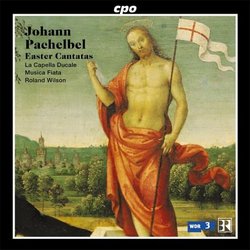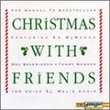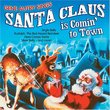| All Artists: Pachelbel, Wilson, Capella Ducale, Musica Fiata Title: Johann Pachelbel: Easter Cantatas Members Wishing: 1 Total Copies: 0 Label: Cpo Records Release Date: 4/20/2004 Genres: Pop, Classical Styles: Vocal Pop, Opera & Classical Vocal, Historical Periods, Baroque (c.1600-1750) Number of Discs: 1 SwapaCD Credits: 1 UPC: 761203991624 |
Search - Pachelbel, Wilson, Capella Ducale :: Johann Pachelbel: Easter Cantatas
 | Pachelbel, Wilson, Capella Ducale Johann Pachelbel: Easter Cantatas Genres: Pop, Classical
|
Larger Image |
CD DetailsSimilar CDs |
CD ReviewsAnother milestone for Musica Fiata M. Holmes | Washington D.C., United States | 07/28/2004 (5 out of 5 stars) "It's about time an excellent album of Pachelbel cantatas appeared on the market! Both Johann Mattheson and J.S. Bach have sent us a very clear historical message about the mastery of this great Kappellmeister who held posts in Eisenach, Erfurt, Stuttgart, and Nuremburg. Listeners now have the luxury of basking in the sound of the musico-cultural inheritance of J. S. Bach. What a joy comfort to hear this music performed so well by Musica Fiata; Roland Wilson has thus produced another world-class installment of well-researched performance in late seventeenth-century concerted vocal music (listen also to Musica Fiata's wonderful recording of similar music by the Leipzig Kappellmeister Johann Schelle, also on the CPO label). Actually, I have never heard anything not worth hearing from this label. The same is true for Musica Fiata. Of note on this recording is Musica Fiata's expert period band of instrumentalists who never fail to deliver the appropriate stylistic characteristics in this music, while taking daring risks, and displaying PERFECT intonation. Also, the singers (including some familiar names from past recordings on other Harmonia Mundi, Sony, and CPO projects) could not possibly sing this difficult and glorious repertoire any better than they do in this recording. Note also that for the first time in their recordings, Wilson chooses to use the exotic sound of a double harp with bray pins to great effect in the continuo section. Also, the harp as used as a solo instrument in the section of the cantata "Halleluiah! Lobet dem Herrn" (a setting of Psalm 150) where the text reads "Lobet ihn mit Psalter und Harfen" ("praise him with psaltery and harp"). Other instruments mentioned in this psalm (drums, prass, flutes, cymbals) are all depicted creatively by the expert players of Musica Fiata. This sort of realization brings to mind other seventeenth-centruy settings of the same text, most notably Heinrich Schütz's setting from Psalmen Davids or 1619. This ensemble has clearly mastered this genre of repertoire, and it is not likely that any other similar ensemble in Europe will be able to surpass this perfect balance between performing excellence and sound scholarship within the next several years. " I've Died and Gone to Heaven... Giordano Bruno | Wherever I am, I am. | 01/24/2008 (5 out of 5 stars) "... or so it seems when I listen to some of the stupendous performances of 17th and early 18th C religious music - Scarlatti, Biber, Carissimi, the older Bachs, Buxtehude, and now PACHELBEL - that I've come upon lately. And several of the best have been by Musica Fiata with La Capella Ducale. Listening only to the over-performed Pachelbel Canon is like going to San Francisco and only eating at Fisherman's Wharf. There's a lot more satisfaction to be had from Pachelbel than I suspected, and this recording of six Easter cantatas will prove it to you. I'll crawl way out on the limb and declare that these smaller cantatas are equal to nearly any of Johann Sebastian Bach's in everything except scope. If you want to challenge that assertion, listen to Pachelbel's cantata "Christ Lag in Todesbanden" from this CD in comparison to your favorite performance of Christ Lag in Todesbanden by Bach. You'll quickly notice that the two share a musical idiom, though the Pachelebel has lingering traces of Schuetz and even Monteverdi. Both display intricate and artful counterpoint, dramatic use of homophonic chords to emphasize certain texts, playful but virtuosic instrumental decoration, subtle and supple interplay between voices and instruments, likewise between soloists and chorus, profound emotional expressiveness - all the marks of Bach. But the Pachelbel was written when Bach was not quite 15 years old. It's more concise than most Bach cantatas... dare I say, more polished? You'll have to listen for yourself. Even if you think I'm overpraising the composer, however, you'll be thrilled by the performance. The instrumental ensemble is flawless and displays not only brilliant fiddling by Annette Sichelschmidt but also some lovely exposed passagework on rarer instruments such as the dulzian, a keyless bassoon, and the double harp. The five solo singers all have impeccable Baroque technique and perfect pitch control, but more impressively they all have rich supple beautiful voices. Bass Harry van der Kamp has a tenor's expressiveness even in his lowest register. Tenor Lothar Blum has a bass's power. Male alto Ralf Popken has a virile timbre and fullness of voice that even dedicated counter-tenor haters will have to admire. Sopranos Monica Rauch and Constanze Backes are good beyond my powers of description. And! All five voices blend like a family of siblings raised in harmony, like a quintet of violas da gamba all played by Jordi Savall. These Easter cantatas represent the joyful, triumphant spirit of Christian worship, not the gloom and doubt, so they are uplifting to hear even if you seldom or never venture into a church. And #3, Lobet den Herrn, offers the bonus of a "guided tour" through the instruments of the period, as each instrument is called upon to "praise the Lord" individually. This would be a splendid choice of a CD for someone whose previous experience of Baroque music has been limited." Splendid performances of Pachelbel's masterworks Donley Parmentier | Sunnyvale, CA USA | 02/16/2010 (5 out of 5 stars) "Outside of the famous "Canon", Pachelbel seems to be the most underrepresented composer in the baroque discography.
Here we have his masterfully constructed Easter Cantatas: several bold and brassy (literally!) and some more reflective, but all looking at the joy of the Resurrection. They are masterfully and perfectly performed by Roland Wilson and the Capella Ducale, his band of Authentic instruments and singers. Exciting! Highly recommended for Baroque music fans." |

 Track Listings (6) - Disc #1
Track Listings (6) - Disc #1

